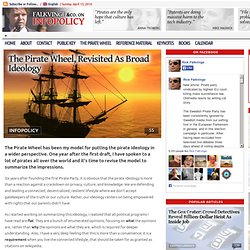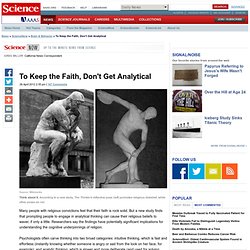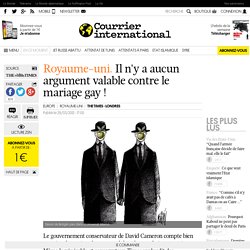

The Pirate Wheel, Revisited As Broad Ideology. The Pirate Wheel has been my model for putting the pirate ideology in a wider perspective.

One year after the first draft, I have spoken to a lot of pirates all over the world and it’s time to revise the model to summarize the impressions. Six years after founding the first Pirate Party, it is obvious that the pirate ideology is more than a reaction against a crackdown on privacy, culture, and knowledge. We are defending and leading a connected, decentralized, resilient lifestyle where we don’t accept gatekeepers of the truth or our culture. Rather, our ideology centers on being empowered with rights that our parents didn’t have. As I started working on summarizing this ideology, I realized that all political programs I have read are flat. Therefore, I’ve rewritten the policies into a policy tree. At the core, at the hub of the wheel, we have to identify what has changed in the sociotechnical landscape that gives birth to a new ideology. The policy tree of The Pirate Wheel.
To Keep the Faith, Don't Get Analytical. Many people with religious convictions feel that their faith is rock solid.

But a new study finds that prompting people to engage in analytical thinking can cause their religious beliefs to waver, if only a little. Researchers say the findings have potentially significant implications for understanding the cognitive underpinnings of religion. Psychologists often carve thinking into two broad categories: intuitive thinking, which is fast and effortless (instantly knowing whether someone is angry or sad from the look on her face, for example); and analytic thinking, which is slower and more deliberate (and used for solving math problems and other tricky tasks). Both kinds of thinking have their strengths and weaknesses, and they often seem to interfere with one another.
One example comes from a study by neuroscientist and philosopher Joshua Greene and colleagues at Harvard University, published last September in the Journal of Experimental Psychology. Log In - The New York Times. Bernard Stiegler : « Le marketing détruit tous les outils du savoir » - Société de consommation. Texte publié intégralement dans la revue Soldes [1], que vous pouvez vous procurer dans l’une de ces librairies ou lors de l’événement organisé au Point éphémère à Paris le 24 mars (voir à la fin de l’article).

Peut-on sortir de l’ère industrielle ? J’ai la conviction profonde que ce qu’on appelle humain, c’est la vie technicisée. La forme de vie qui passe par la technique, qu’elle soit du silex taillé ou du silicium, organisée comme aujourd’hui par un microprocesseur ou par autre chose. Dans tous les cas, nous avons affaire à de la forme technique. L’individuation psychique, c’est-à-dire la manière de devenir ce que je suis, l’individuation collective, la manière dont se transforme la société dans laquelle je vis, et l’individuation technique, la manière dont les objets techniques se transforment, sont inséparables.
Quand on appréhende les questions dans leur globalité, il est inconcevable de faire face à cette poussée démographique avec des moyens non industriels. Et aux États-Unis ? Il n'y a aucun argument valable contre le mariage gay ! Le gouvernement conservateur de David Cameron compte bien autoriser le mariage homosexuel dans les prochaines semaines.

Même le vénérable et conservateur Times applaudit des deux mains. J’ai essayé de trouver une raison d’être contre le mariage homosexuel : il n’y en a pas. Il n’y a que Dieu, et berk !” Et si ces raisons peuvent paraître convaincantes pour qui les professent, elles ne le sont pas pour moi et elles ne devraient pas l’être pour le pays non plus. Le truc avec ce débat, c’est qu’il n’y a pas de débat. Je n’ai pas toujours été en faveur du mariage homosexuel, je n’en voyais pas l’intérêt. Ce n’est que plus tard que j’ai pris le temps de réfléchir aux revendications des défenseurs du mariage gay. “Le mariage se fait entre un homme et une femme”, disent ceux qui s’y opposent.
Ecologie.